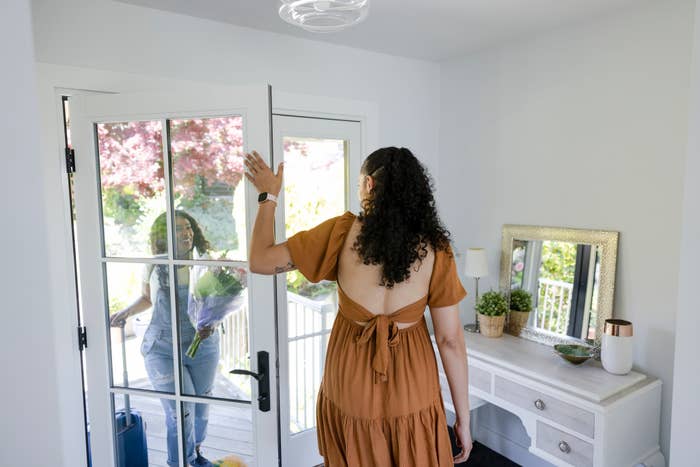Hosting guests at your home overnight is an incredibly generous deed that warrants gratitude and acknowledgment. Just because you’re opening up your place to others, however, doesn’t mean you have the right to treat them poorly.
“The fact is everyone likes to be treated with respect and kindness,” Jackie Vernon-Thompson, founder of From the Inside-Out School of Etiquette, told HuffPost. “Therefore, there are a few etiquette protocols that a host should consider to ensure their overnight guest feels comfortable, welcomed, respected, and appreciated.”
The guidelines may vary a bit based on your relationship with the guest in question and the nature of their visit. After all, there’s a difference between entertaining your in-laws for two weeks and letting your childhood best friend crash on your couch one night after they’ve had a little too much wine.
But whatever the circumstances, you don’t have to spend a fortune or give up precious hours of your busy life to be a considerate overnight host. Just think about the Golden Rule and some basic dos and don’ts ― especially the don’ts.
Below, Vernon-Thompson and other etiquette experts share some common rude behaviors when hosting guests and their advice for avoiding these mistakes.
Not Providing Clean Sheets Or Towels
Even if you aren’t the type to scrub the house from top to bottom, cook special multi-course meals and put out vases of fresh flowers for your overnight guests, you do need to provide the essentials. That means clean sheets and towels so that they may comfortably sleep and shower during their stay.
“Freshly laundered linens and towels should be easily accessible,” said Tami Claytor, the etiquette coach behind Always Appropriate Image & Etiquette Consulting.
The most basic need of an overnight guest is a comfortable (and ideally private) place to sleep, so make that a priority. Test out that pullout couch or old cot beforehand.
“Do a sleepover in your own guest room so you know if the mattress is comfortable, the sheets need repair or should be replaced and the duvet needs to go to the cleaners,” said Diane Gottsman, the author of “Modern Etiquette for a Better Life” and founder of The Protocol School of Texas.
If for some reason you aren’t able to provide clean sheets or towels to your guest, ask them in advance if they can pack their own. But guests shouldn’t be expected to bring their own toilet paper, hand soap, and bath products ― you should provide those.
“Your home should be a makeshift hotel suite for the night,” Vernon-Thompson said. “Supplying these items translates to your guest that you thought of their comfort.”
Hovering
“Allow the guest some downtime,” said Jodi R.R. Smith, president of Massachusetts-based Mannersmith Etiquette Consulting. “If the guest excuses themself to go to their room to read or nap, do not listen at the door or tap gently to see if they are actually awake. If the guest is checking their mobile or responding to an email, do not ask each time what it was about.”
It’s reasonable to need a little alone time, so don’t expect your guest to spend every waking moment of their stay hanging out with you. Give them their space, and trust that everything is fine.

“Do not turn off the lights the second the guest leaves a room,” Smith added.
Similarly, don’t walk behind them and pick up or clean up after them every step of the way ― unless there’s an immediate need like wiping up a spilled drink.
“Picking up after a guest in their view indicates to them that you are unhappy with the way they are keeping your home or the area,” Vernon-Thompson said. “It also shows that you are perhaps annoyed by their lack of maintenance. In order for me to prevent making [an untidy guest] feel awkward or unwelcomed, I literally stay out of the bathroom and the area the guest will use. Once they leave my home, I clean the areas to my satisfaction.”
Ignoring Allergies
“Before your guest arrives, it is best to have a conversation with them in reference to any food allergies they may have and dietary restrictions,” Vernon-Thompson said. “The last thing a host wants is to provide food that will cause their guest to become ill or worse. Therefore, that conversation is a must.”
Guests aren’t always forthcoming about their needs, so as you prepare for their visit, just ask if there’s anything you should know.
“Not all hosts will be able to accommodate all issues, and that is OK,” Smith said. “Since it was discussed in advance, other accommodations can be made. If your guest has a severe food allergy and your home has plenty of the item in and around the kitchen, the guest should be referred to appropriate accommodations nearby.”
If you find out they have asthma or issues with certain fragrances, make sure the air fresheners or cleaning products you use won’t be a problem. Similarly, if you have a dog and your guest is severely allergic to dog fur, discuss if it makes sense for them to stay with you.
“You will not be giving away your dog,” Smith added. “The guest should be referred to appropriate accommodations nearby.”
And if you want to be extra considerate, ask about their specific likes and dislikes and then stock your fridge and pantry with their favorite foods and drinks. Put out their favorite flowers or soaps with their preferred scents as well.
Not Welcoming Your Guest Into Your Home
“It is lovely to be able to greet guests at the door,” Smith said. “Usher them in, allow them to put down their bags, take off any outer garments, and offer them a chance to ‘freshen up’ (i.e., use the restroom), before offering light refreshments and something to drink.”
She noted that the initial welcome helps set the tone for the rest of the visit and shows that you understand how far they’ve traveled to be there. Try to make sure the place is at least relatively tidy ahead of their arrival.
“If you are not able to be there when your guests arrive, leave a note of welcome with instructions as well as some munchies and drinks,” Smith added. “Be sure to specify when you will return and suggest what they should or could do in the meantime.”
Encourage your guests to make themselves at home and get comfortable. Once they’re settled, give them a tour if they aren’t familiar with the space.
“Have an available closet space where your guest can comfortably place some of their clothes out of their suitcase during their stay,” Gottsman added.

Not Sharing Important House Information
“For overnight guests, ensure they know where they can find the essentials, like the Wi-Fi password, phone chargers, extra towels, and coffee for the morning,” said Nick Leighton, an etiquette expert and co-host of the “Were You Raised by Wolves?” podcast.
Consider writing or printing out a note with information about your home and any pertinent idiosyncrasies. Smith suggested including the Wi-Fi name and password, address for ordering an Uber, and the location of toilet paper and other basics. She also shared some sample “peccadilloes” to point out as well.
“The cat will join you in bed if you do not fully close your door,” Smith noted as an example. “Occasionally, the pipes will bang when the heat is about to turn on, it is not a ghost. To exit the bathroom, turn the knob to the left. The hot water is instantly scalding in the shower, adjust from outside of the tub.”
Specify which bathroom your guest can use during their stay. If there are rooms or spaces you’d prefer they don’t enter, omit these areas from your home tour or mention you’d rather people avoid them. Don’t get mad at your guest for reasonable mistakes, however.
“Decorative soap and towels in the guest bathroom? Those are fair game for guests to use, so don’t leave something out if you don’t want it used,” Leighton said.
Refrain from presenting a long list of strict rules as well.
“Unless there are special circumstances in the home such as a special needs child who may be accustomed to certain practices at a specific time of the day, there should not be a list of rules,” Vernon-Thompson noted. “If there are certain religious practices, then definitely advise your guest of that prior to their arrival and I am sure they will respect it.”
Failing To Communicate About Plans And Expectations For The Visit
“Discuss everyone’s schedule in advance so people know what time everyone’s planning on getting up and what the plan is for the following day,” Leighton said.
Try to be inclusive but not demanding when it comes to the schedule you’ve envisioned.
“A faux pas would be not including guests in previously scheduled plans,” Claytor said. “Or expecting guests to do things exactly as you do.”
Both hosts and guests should show consideration for each other’s needs and lifestyles.
“Allow for some schedule flexibility,” Smith said. “You may like going to bed at 7:30 at night, but you cannot demand the guests do the same. Nor can you forbid them from speaking or watching TV that early in the evening.”
Still, try to keep these needs within reason and again, offer the opportunity to discuss any unusual issues in advance.
“Your guest hosting a Zoom program at 2 a.m. for viewers around the world may not work for your sleeping family,” Smith noted. “The guest should be referred to appropriate accommodations nearby.”
Originally published on HuffPost.
